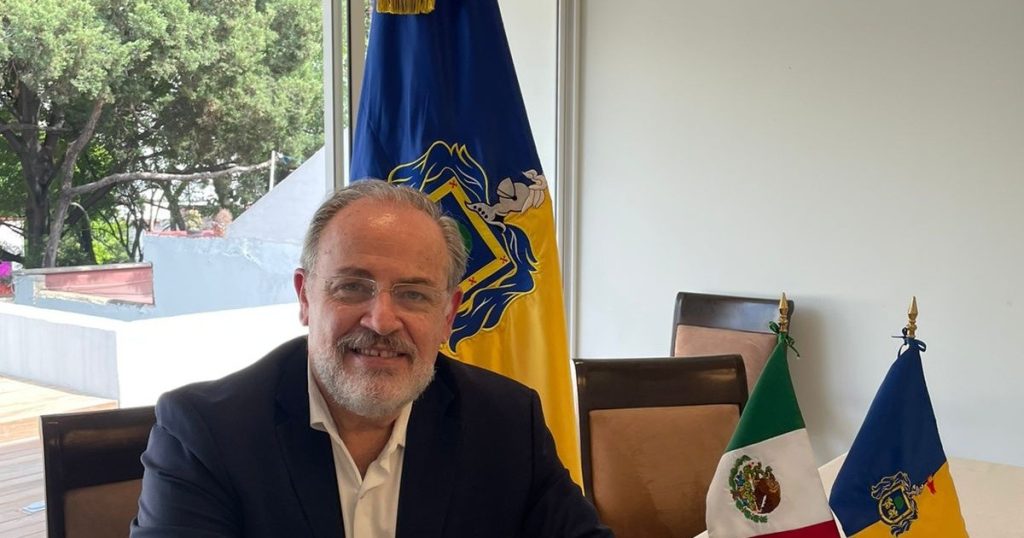The Covid-19 pandemic has forced health authorities in Jalisco to dramatically improve services in this sector. In 2019, only 14% of care centers are accredited, that is, they have adequate infrastructure, equipment and staff to serve patients with high-quality services; However, at the end of 2021, 62% have already been certified, it is expected that by the end of 2022 it will reach 80% and by 2023 it will reach 100%, Fernando Petersen-Aranguren reports.
In an interview, the Minister of Health of the government of that entity explained that, to date, more than 1,600 million pesos have been invested to improve health infrastructure and this figure is expected to reach about 6,000 million pesos for 2024.
He emphasized that the goal is to improve the infrastructure, both primary and highly specialized centers.
On the other hand, he emphasized that it was a wise decision by the Jalisco government not to hand over state services to the Institute of Health for Welfare (Insabi) set up by the Federal Government to replace Seguro Popular and that it has started its operations. Right at the beginning of the epidemic, in early 2020.
At that time, the state government made the decision to maintain control over the state health services, mainly due to not knowing the rules for operating the new system. He pointed out that after two years it proved to be the right decision.
But he stressed that the state government is clear that Jalisco is not self-sufficient to cover all the health needs of its residents, and that it needs the union’s support, especially to treat high-cost diseases that generate disastrous expenditures for families.
When they happen, so we’re working with the federal government to join forces.
In this sense, the Minister commented on the federal government’s proposal to add state health services to the IMSS-Wellness program, the characteristics should be carefully analyzed, since all operating rules have not yet been established.
Therefore, the state government will continue to maintain oversight of health services, as long as it does not guarantee that the new programs provide greater coverage, satisfaction and better health for the people of Jalisco.
He commented that in Jalisco just over 50% of the population is served by social security services such as IMSS and ISSSTE and the rest is public sector dependent and it is a priority to advance in accreditation of services.
Jalisco differed in containing the epidemic
Petersen Aranguren commented that Jalisco has distinguished itself from other entities and the federal government in implementing public policies to contain the Covid-19 pandemic, which has allowed it to obtain positive results.
He noted that the identification of a probable case of Covid in Jalisco, since January 2020, prompted preventive measures, even earlier than in the rest of the country, to procure supplies, equipment and protective materials for professionals. Health in the adequacy of hospitals based on the recommendations of experts in the field.
He noted that while Jalisco issued a 10-day preventive confinement order in cities, such as the country’s capital, huge events have been held.
In addition, in recognition of the health authority represented in the federal government, it has followed the recommendations made by other international authorities in this matter.
Likewise, we understood that it was an unusual issue that must be confronted with extraordinary measures to listen to academics, scientists and technicians and a health schedule was installed, where the measures to be followed to contain the epidemic are discussed and determined.
The official said that the four pillars of the epidemic containment strategy have been identified. The first is to empower public health professionals, to be able to identify cases, isolate them, and break chains of infection.
The second was the tests. He said that from the start
The Jalisco government was very clear that it was necessary to conduct tests in order to obtain reliable information to find out what they were facing.
While the strategy at the federal level was to implement it only for those who showed symptoms of the disease in Jalisco, it was decided to implement it on a large scale, by implementing the Radar Jalisco system in which the education and health institutions are from the private sector.
The third pillar was the attention of experts who indicated that it is an airborne virus, and the use of face masks was very important to break chains of infection.
The fourth pillar is the therapeutic approach. In that sense, he said, getting vaccinations was essential to contain the pandemic.
On the other hand, he explained, the pandemic has complicated access to medicines. However, since Jalisco is not a member of Insabi, it purchases its own medicines, which has allowed it not to suffer from some of the shortage problems that occur on a national scale.
He admitted that the level of supply was low at the time of the epidemic, especially for pain relievers and muscle relaxants, but currently more than 75% of the medicines are supplied naturally.
He said that two years after the spread of the epidemic and with a significant decrease in the infection rate, the priorities are to continue to detect cases that appear in order to isolate them and vaccinate the largest number of people to reduce hospitalizations and deaths, restore the postponed consultation due to the pandemic and return to daily life in the units health and service improvement.

“Beeraholic. Friend of animals everywhere. Evil web scholar. Zombie maven.”

:quality(85)/cloudfront-us-east-1.images.arcpublishing.com/infobae/P7LSKWYROJABFFOOOKC2JQUNNQ.jpg)

:quality(85)/cloudfront-us-east-1.images.arcpublishing.com/infobae/2XGJWLHUPJA7BDD7U6G7ZR4VFU.jpg)



More Stories
They are creating a miracle material that could replace graphene. It is a thin two-dimensional layer of gold.
The trick to getting homemade deodorant without chemicals
They find ichthyotitans, the largest marine reptiles ever found, two buses long